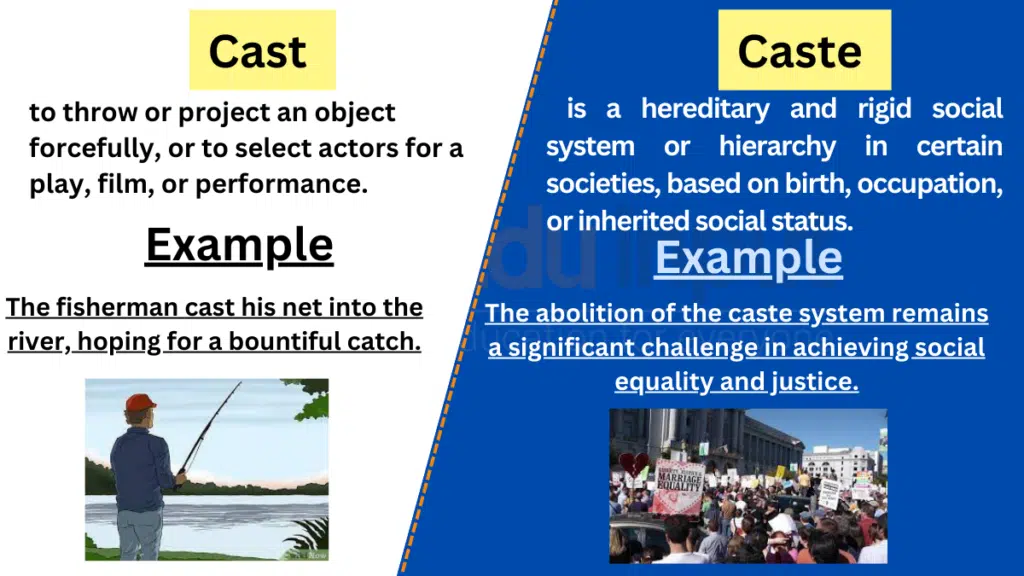Cast vs. Caste-Difference between and Examples
By understanding the differences between “cast” and “caste,” we can effectively navigate conversations related to the act of throwing or selecting actors for performance and the social system based on birth or occupation. “Cast” functions as a verb, describing the action of throwing or projecting an object forcefully or selecting actors for a play. On the other hand, “caste” serves as a noun, representing a hereditary and rigid social system or hierarchy prevalent in certain societies. By using these terms accurately, we can engage in meaningful discussions about the performing arts and societal structures with clarity and precision.

Meanings and Examples
Cast meaning
The cast is a Verb. The meaning of cast is to throw or project an object forcefully, or to select actors for a play, film, or performance.
Cast Examples
a) The fisherman cast his net into the river, hoping for a bountiful catch.
b) She cast her vote in the election, exercising her democratic right.
c) The magician cast a spell, captivating the audience with his enchanting performance.
d) The director cast talented actors for the lead roles in the upcoming play.
e) He cast his gaze upon the beautiful landscape, mesmerized by its breathtaking beauty.
Caste meaning
Caste is a Noun. The meaning of caste is a hereditary and rigid social system or hierarchy in certain societies, based on birth, occupation, or inherited social status.
Caste Examples
a) The Indian caste system categorizes individuals into different social groups based on their birth and occupation.
b) In some cultures, one’s caste determines their social standing and the opportunities available to them.
c) The caste system in ancient societies often limited social mobility and perpetuated inequalities.
d) Members of the noble caste enjoyed privileges and advantages denied to those in lower castes.
e) The abolition of the caste system remains a significant challenge in achieving social equality and justice.
Difference between Cast vs. Caste
| Criteria | Cast | Caste |
| Meaning | To throw or select actors for a performance | A social system or hierarchy based on birth or occupation |
| Part of Speech | Verb | Noun |
| Pronunciation | kɑːst | keɪst |
| Usage | Referring to throwing or selecting actors | Describing a social system based on birth or occupation |
Usage in a Paragraph:
The director carefully cast the actors for the play, ensuring that each role was filled with the most suitable performer. The casting process involved auditions and assessments to determine the actors’ suitability for their respective roles.
In the ancient kingdom, individuals were assigned to specific castes based on their birth and occupation. The caste system determined one’s social standing, rights, and privileges, creating a hierarchical society with limited opportunities for upward mobility.



Leave a Reply